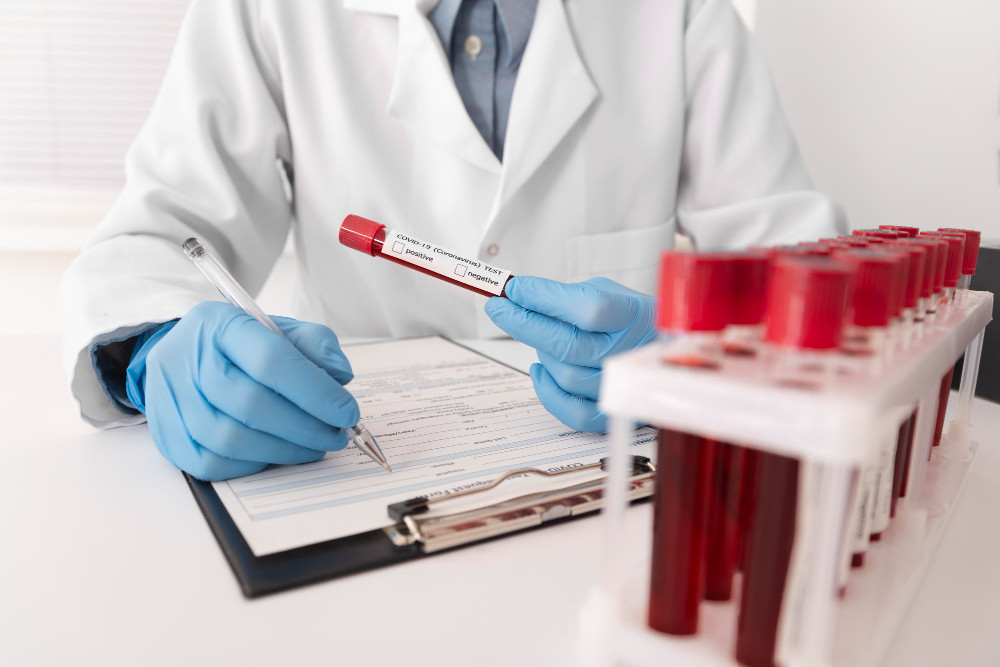Tes amphetamine merupakan salah satu prosedur yang dilakukan dalam tes narkoba. Amphetamine sendiri adalah obat stimulan yang dapat memberikan efek kemudahan konsentrasi, peningkatan kewaspadaan dan rasa percaya diri. Sayangnya obat ini sering disalahgunakan sehingga dapat menyebabkan seseorang mengalami kecanduan obat.
Apa Itu Amphetamine?
Amphetamine atau amfetamin adalah obat stimulan yang mempercepat fungsi tubuh. Dokter umumnya memberikan amphetamine pada pasien ADHD atau narkolepsi. Pada beberapa kasus, dokter juga dapat meresepkan obat amphetamine untuk mengatasi obesitas meskipun sangat jarang terjadi.
Dalam tubuh kita, neurotransmitter mengirimkan sinyal dari sel saraf ke berbagai jaringan di dalam tubuh. Obat amphetamine membuat sistem saraf pusat bekerja lebih cepat dengan cara meningkatkan jumlah neurotransmitter seperti dopamine, norepinephrine dan serotonin.
Akibatnya, saat mengonsumsi amphetamine orang akan merasa waspada, lebih fokus, lebih berenergi, tenang dan bahagia. Efek samping inilah yang diincar banyak orang sehingga banyak yang menyalahgunakan obat amphetamine.
Baca Juga: Berbagai Risiko Kesehatan Yang Disebabkan Kecanduan Narkoba
Prosedur Tes Amphetamine
Untuk memeriksa kadar amphetamine dalam tubuh bisa dilakukan dengan menggunakan sampel urine, darah, air liur dan rambut. Namun cara yang paling populer saat ini adalah dengan menggunakan tes urine.
Pada sistem tubuh, amphetamin dapat bertahan selama waktu berikut:
- Urine: hingga 3 hari
- Darah: hingga 48 jam
- Air liur: hingga 60 jam
- Rambut: hingga 3 bulan
Pemeriksaan amphetamine biasanya dilakukan ketika seseorang menunjukkan gejala overdosis atau penyalahgunaan obat, kebutuhan dalam seleksi pekerjaan atau seleksi sekolah dan untuk menunjukkan bahwa seseorang bersih dan bebas dari penyalahgunaan narkotika.
Baca Juga: Bagaimana Tahapan Rehabilitasi bagi Pecandu Narkoba di Indonesia?
Pemeriksaan amphetamine dapat dilakukan dengan pengambilan sampel darah atau urine. Pada pemeriksaan urine, Anda akan diminta untuk menampung urine pada wadah khusus. Saat menampung urine, jangan tampung urine yang pertama kali keluar. Setelah urine berhasil ditampung, serahkan wadah ke laboratorium untuk dilakukan pemeriksaan.
Sementara itu pada pemeriksaan darah akan dilakukan dengan mengambil sampel darah dari lipatan lengan. Jumlah darah yang diambil akan disesuaikan dengan kebutuhan pemeriksaan, namun umumnya sekitar 0,3-0,5 ml.
Hasil Pemeriksaan Amphetamine
Pemeriksaan urine
Pemeriksaan urine menunjukkan hasil positif amphetamine jika pada alat pemeriksaan menunjukkan 2 garis yang jelas. Hal ini mengindikasikan bahwa dalam urine terdapat kadar amphetamine yang cukup tinggi atau lebih dari 500 ng/ml. Jika kadar amphetamine cukup tinggi, maka seseorang baru saja mengonsumsi amphetamine dalam waktu 3 hari terakhir.
Sedangkan seseorang dikatakan memiliki hasil negatif jika hasil pemeriksaan menunjukkan 1 garis pada alat pemeriksaan.
Pemeriksaan darah
Pada pemeriksaan darah, seseorang dikatakan memiliki hasil positif amphetamine jika dalam darah terdapat kadar amphetamine hingga di atas 0,2 mg/l.
Jika seseorang memiliki hasil pemeriksaan amphetamine positif, maka perlu dilakukan pemeriksaan lanjutan apakah ia sedang dalam pengobatan masalah kecemasan atau melakukan penyalahgunaan obat-obatan amphetamine. Jika diperlukan dokter akan melakukan pemeriksaan fungsi ginjal dan skrining hepatitis B dan C.
Pemeriksaan amphetamine merupakan salah satu pemeriksaan yang dilakukan dalam tes narkoba. Anda dapat berkonsultasi mengenai hasil pemeriksaan amphetamine dengan dokter. Anda juga dapat memanfaatkan layanan pada aplikasi Ai Care yang berbasis artificial intelligence untuk berkonsultasi dan mendapatkan informasi seputar kesehatan lainnya.
Mau tahu tips dan trik kesehatan, pertolongan pertama, dan home remedies lainnya? Cek di sini, ya!
- dr Nadia Opmalina
Amy Morin. (2023). What to Know About Adderall XR. Available from: https://www.verywellmind.com/adderall-xr-4780485
University of Rochester Medical Center. Amphetamine Screen (Blood). Available from: https://www.urmc.rochester.edu/encyclopedia/content.aspx?contenttypeid=167&contentid=amphetamine_blood_screen
University of Rochester Medical Center. Amphetamine Screen (Urine). Available from: https://www.urmc.rochester.edu/encyclopedia/content.aspx?contenttypeid=167&contentid=amphetamine_urine_screen
Mayo Clinic Laboratories. Amphetamine-Type Stimulants (ATS). Available from: https://test.mayocliniclabs.com/test-info/drug-book/amphetamine.html
Erica Hersh. (2023). How Long Does Adderall Stay in Your System?. Available from: https://www.healthline.com/health/how-long-does-adderall-stay-in-your-system












